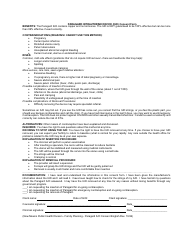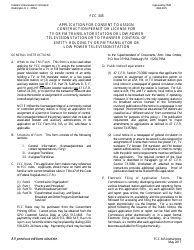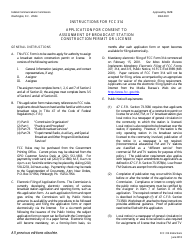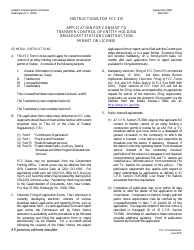Levonorgestrel (Lng) Intrauterine Device (Iud) Consent Form - New Mexico
Levonorgestrel (Lng) Intrauterine Device (Iud) Consent Form is a legal document that was released by the New Mexico Department of Health - a government authority operating within New Mexico.
FAQ
Q: What is a Levonorgestrel (Lng) Intrauterine Device (Iud)?
A: A Levonorgestrel (Lng) Intrauterine Device (Iud) is a small, T-shaped device that is inserted into the uterus to provide long-term, highly effective contraception.
Q: How does a Levonorgestrel (Lng) Intrauterine Device (Iud) work?
A: The Levonorgestrel (Lng) Intrauterine Device (Iud) works by releasing a small amount of a hormone called levonorgestrel, which thickens cervical mucus, inhibits sperm movement, and thins the lining of the uterus.
Q: How long does a Levonorgestrel (Lng) Intrauterine Device (Iud) last?
A: A Levonorgestrel (Lng) Intrauterine Device (Iud) can provide contraception for up to 3, 5, or 7 years depending on the specific device.
Q: Is the Levonorgestrel (Lng) Intrauterine Device (Iud) reversible?
A: Yes, the Levonorgestrel (Lng) Intrauterine Device (Iud) is reversible. It can be removed at any time, and fertility usually returns quickly.
Q: What are the advantages of using a Levonorgestrel (Lng) Intrauterine Device (Iud)?
A: Advantages of using a Levonorgestrel (Lng) Intrauterine Device (Iud) include long-term effectiveness, convenience, and high levels of contraceptive effectiveness.
Q: What are the possible side effects of a Levonorgestrel (Lng) Intrauterine Device (Iud)?
A: Possible side effects of a Levonorgestrel (Lng) Intrauterine Device (Iud) include cramping, irregular bleeding, and changes in menstrual bleeding pattern.
Q: Is a Levonorgestrel (Lng) Intrauterine Device (Iud) suitable for everyone?
A: A Levonorgestrel (Lng) Intrauterine Device (Iud) may not be suitable for everyone, and a healthcare provider should evaluate the individual's medical history before insertion.
Q: How effective is a Levonorgestrel (Lng) Intrauterine Device (Iud) in preventing pregnancy?
A: A Levonorgestrel (Lng) Intrauterine Device (Iud) is more than 99% effective in preventing pregnancy.
Q: Are there any risks associated with a Levonorgestrel (Lng) Intrauterine Device (Iud)?
A: There are some risks associated with a Levonorgestrel (Lng) Intrauterine Device (Iud), including infection, perforation of the uterus, and expulsion of the device.
Form Details:
- Released on November 1, 2019;
- The latest edition currently provided by the New Mexico Department of Health;
- Ready to use and print;
- Easy to customize;
- Compatible with most PDF-viewing applications;
- Fill out the form in our online filing application.
Download a printable version of the form by clicking the link below or browse more documents and templates provided by the New Mexico Department of Health.

















